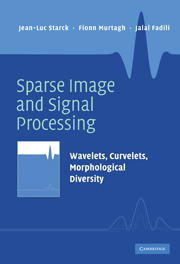Book contents
- Frontmatter
- Contents
- Acronyms
- Notation
- Preface
- 1 Introduction to the World of Sparsity
- 2 The Wavelet Transform
- 3 Redundant Wavelet Transform
- 4 Nonlinear Multiscale Transforms
- 5 The Ridgelet and Curvelet Transforms
- 6 Sparsity and Noise Removal
- 7 Linear Inverse Problems
- 8 Morphological Diversity
- 9 Sparse Blind Source Separation
- 10 Multiscale Geometric Analysis on the Sphere
- 11 Compressed Sensing
- References
- List of Algorithms
- Index
- Plate section
9 - Sparse Blind Source Separation
Published online by Cambridge University Press: 06 July 2010
- Frontmatter
- Contents
- Acronyms
- Notation
- Preface
- 1 Introduction to the World of Sparsity
- 2 The Wavelet Transform
- 3 Redundant Wavelet Transform
- 4 Nonlinear Multiscale Transforms
- 5 The Ridgelet and Curvelet Transforms
- 6 Sparsity and Noise Removal
- 7 Linear Inverse Problems
- 8 Morphological Diversity
- 9 Sparse Blind Source Separation
- 10 Multiscale Geometric Analysis on the Sphere
- 11 Compressed Sensing
- References
- List of Algorithms
- Index
- Plate section
Summary
INTRODUCTION
Over the past few years, the development of multichannel sensors has motivated interest in methods for the coherent processing of multivariate data. Areas of application include biomedical engineering, medical imaging, speech processing, astronomical imaging, remote sensing, communication systems, seismology, geophysics, and econometrics.
Consider a situation in which there is a collection of signals emitted by some physical objects or sources. These physical sources could be, for example, different brain areas emitting electrical signals; people speaking in the same room (the classical cocktail party problem), thus emitting speech signals; or radiation sources emitting their electromagnetic waves. Assume further that there are several sensors or receivers. These sensors are in different positions so that each records a mixture of the original source signals with different weights. It is assumed that the mixing weights are unknown because knowledge of that entails knowing all the properties of the physical mixing system, which is not accessible in general. Of course, the source signals are unknown as well because the primary problem is that they cannot be recorded directly. The blind source separation (BSS) problem is to find the original signals from their observed mixtures without prior knowledge of the mixing weights and by knowing very little about the original sources. In the classical example of the cocktail party, the BSS problem amounts to recovering the voices of the different speakers from the mixtures recorded at several microphones.
Information
- Type
- Chapter
- Information
- Sparse Image and Signal ProcessingWavelets, Curvelets, Morphological Diversity, pp. 218 - 244Publisher: Cambridge University PressPrint publication year: 2010
